Household pests, such as termites, cockroaches, fleas, ants, wood-destroying beetles and stored product pests, are some of the common insect pests we encounter in our living spaces. Although most are considered to be a nuisance, some can cause serious damage to our property. Others may bite, sting and even transmit disease-causing agents.
Some of these insect pests are seasonal, yet some take no time off and require a year-round pest management program. There are certain pests, such as termites, that homeowners should not attempt to treat by themselves. A professional who is trained and possesses the skills, equipment and proper pesticides is the logical choice.
Our lawns add aesthetic quality and increase our home property values. Professional lawn care services are popular in our urban areas as many homeowners wish to pursue activities other than lawn maintenance. Many of the professional lawn care services offer year-round comprehensive pest control packages to control weeds, insects, diseases and vertebrate pests.
Regardless of structural or lawn pest control, many people contract the services of a pest control company to take care of their pest problems. All pest control operators who commercially apply any pesticide are certified and licensed by the state of Missouri. These applicators are required by law to pass qualifying exams that test their knowledge to prove their competence. In order to maintain their certification status, all commercial applicators are required to attend educational programs on a continual basis.
Homeowners who choose professional pest control services need to be able to make informed decisions on deciding whom to contract for treatment of their properties. Choosing a pest control service is generally based upon two major factors: first, the effectiveness of the company's pest management programs, and second, the satisfaction level provided by the company's customer service. When searching through the yellow pages of a telephone directory, you may encounter many companies listed under "pest control services" or "lawn services." The purpose of this guide is to provide information on how to make an informed decision on selecting a professional pest control service.
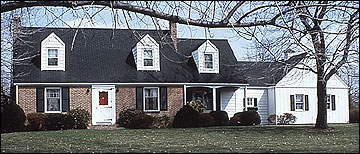 Homeowners occasionally require the services of a professional pesticide applicator for lawn, garden and structural pests.
Homeowners occasionally require the services of a professional pesticide applicator for lawn, garden and structural pests.
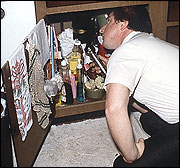 Pest control professionals make treatment decisions based on whether pests are present.
Pest control professionals make treatment decisions based on whether pests are present.
Evaluating the effectiveness of a company's pest control service
A referral from a neighbor or relative is better than any sales pitch that a company salesperson will provide. Keep in mind that pesticides are not silver bullets, and you will be asked by the pest control professional to take certain measures to implement a complete integrated pest management (IPM) plan. IPM requires homeowner cooperation for maximum pest control effectiveness. Although IPM does not exclude pesticides, it does include methods such as sanitation, exclusion, other pest management products and proper cultural control practices. When indoor pests are a problem, sanitation will go a long way in improving the chances of maximum effectiveness of control.
Exclusion is an easy-to-use method and simply refers to keeping pests outside of the home. Repair window screens and doors and seal exposed cracks to prevent easy entrances for many types of pests.
There are other pest management products that are available from retail centers for homeowners. Various attractants, pheromones, repellents, glue boards and traps may be practical in some situations. When using any pesticide product, be sure to read and follow the label directions.
Lawn care services contracted for pest control will usually leave a reminder notice of cultural practices to implement for maximum effectiveness. A healthy lawn is the best defense against any pest outbreak. Proper watering, mowing and fertility practices are a large part of the IPM program in combating lawn pests.
Ask the person selling the pest control program to outline the program's steps and how you can assist to achieve the best control for your money. Good cooperation between the customer and the company will result in optimal results.
Evaluating customer service
The same may be said for checking into the effectiveness of the company's control plan — ask around. Ask why neighbors or friends selected a certain company and if they have had negative experiences with other companies. Call the Better Business Bureau to see if there are any outstanding claims against the company.
In most cases, you will have a choice of companies and customer satisfaction is a matter of personal preference. A homeowner should take into account the following considerations as well. Will chemical sensitivity be an issue for any of the family members? If so, there may be alternatives, such as organic products, that a company has to control the pest without using traditional chemical pesticides. Be realistic of the expectations because organic products have limitations in the pest control industry. Don't believe exaggerated claims about these products or any other line of products; if it sounds too good to be true, then it probably is. For some, the proposed management plan may not fit their lifestyles.
Remember, for optimal control effectiveness, you may be asked to implement some of the techniques previously mentioned in this guide. Is that manageable? Some pest control companies will have varying types of contracts; they may offer year-round, regular visits; others may require you to contact the company when a pest outbreak occurs. You must decide which is most appropriate for your particular situation.
Consider the following factors when choosing a professional pest control operator:
- Do they appear neat and act in a professional manner?
- When you made the appointment for an initial consultation, were they on time?
- Are they able to answer your questions in a satisfactory manner?
- Do their vehicles and equipment appear clean, neat and in good working order?
Get several bids. Remember to get several bids to compare prices, services offered and terms of the contract. The lowest price is not necessarily the best deal; you want to pay for quality service that is effective. Any pest control service should provide a detailed inspection of your property. Lawn care services often structure their prices on the size of the area to be treated. Does the lawn care company's measured area accurately reflect the true area? Some companies will purposefully underestimate the area in an attempt to undercut a competitor. Such practices may lead to application of inadequate materials and sloppy service.
Check references. Any reputable professional pest control service will have references available for your inspection. Don't assume that they do; ask them.
Certificate of insurance. In Missouri, state law requires commercial pesticide applicators to carry both liability and bodily injury insurance. Ask to see their insurance certificate.
State license. All states, including Missouri, require persons who apply pesticides on a commercial basis to be certified and licensed. Request the license number to be sure the person you are dealing with is a legal applicator. You can check with the Missouri Department of Agriculture's Bureau of Pesticide Control for these records. Call the bureau during normal business hours at 573-751-5509.
Professional association membership. Many companies belong to a professional association. Associations such as the Missouri Valley Turfgrass Association and the Missouri Pest Control Association offer their members educational opportunities to keep them abreast of new technology and other developments. Such organizations also have codes of ethics to help members strive to meet quality standards.
Terms of a contract
Make sure that you have a contract before any work is done. Contract wording varies from company to company, and there are different contracts for different applications. Before signing a contract, carefully read through the entire contract and consider the following general issues when considering a pest control service.
- Are there exclusion clauses in the contract? Such clauses specify why a contract can be cancelled. There may be any number of such clauses; be aware of these. If you wish to cancel a contract, will penalties be assessed?
- Be sure that the name and address of the pest control company is on the contract.
- When you start a service, you may be authorizing the service to run continuously until you notify them to discontinue. Other contracts may be for certain terms, such as one year or any other specified length of time. Be sure to read and understand the service agreement terms. With lawn care companies, ask if they will retreat your lawn before your next regularly scheduled treatment if you feel adequate control of a pest was not achieved.
- With termite contracts, there may be a "re-treatment only" clause. Generally, this means that the company will re-treat your house if termites reinfest the structure. If so, the company will not assume liability for damage caused by the reinfestation of termites. Other termite contracts may have a "damage replacement" clause. This usually means that the company will pay for any damage incurred by the termites while you have been under that contract. Some companies may not offer you contracts with either of these clauses if they deem the construction, such as wood-to-ground contact or leaky roofs, or other factors, such as landscaping too close to the structure, to be conducive for termite infestation. There may be any number of such reasons why a company will not make such offerings.
- Look carefully for any disclaimers that may be in the "small print."
- Are there "arbitration" clauses? These describe measures that may be taken should a dispute arise.
Be wary of
- Sales pitches that promote "special prices" if you act now or if you purchase a package deal. If you purchase a package deal, you may receive pest control applications for pests that are not even present. Another such pitch may be that they have material "left over" from a previous job and will offer a special deal.
- Companies that don't provide you with a telephone number and business address.
- Sales pitches that claim a certain pest is a neighborhood problem and that your property should be treated for protection. Just because a neighbor has a certain pest problem is no guarantee that you or any other neighbors share the same problem.
- A company that has a pricing structure based on "gallons of material" used to treat the job. Termite jobs can require hundreds of gallons of diluted termiticides to satisfactorily control a problem. Such a pricing structure may wind up costing exorbitant amounts of money.
- Sales pitches that claim "secret" or "new and improved" formulations to treat a pest. There are no secrets, as all pesticides used in Missouri must be registered with the Environmental Protection Agency and the Missouri Department of Agriculture. You have every right to ask for a copy of the pesticide label of any product that is applied to your property. Don't accept any snake oils.
- Anyone who tells you that your house is structurally unsound and should be treated immediately.
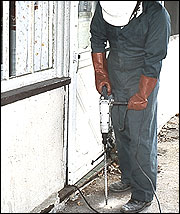 Pest control professionals stay up to date on regulations regarding termiticide treatment.
Pest control professionals stay up to date on regulations regarding termiticide treatment.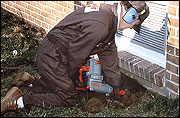 Pest control professionals are trained to operate specialized equipment.
Pest control professionals are trained to operate specialized equipment.
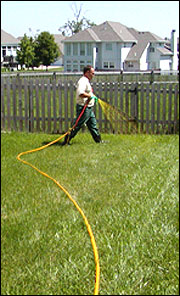 The majority of all professional applicators in Missouri work in the greens industry.
The majority of all professional applicators in Missouri work in the greens industry.